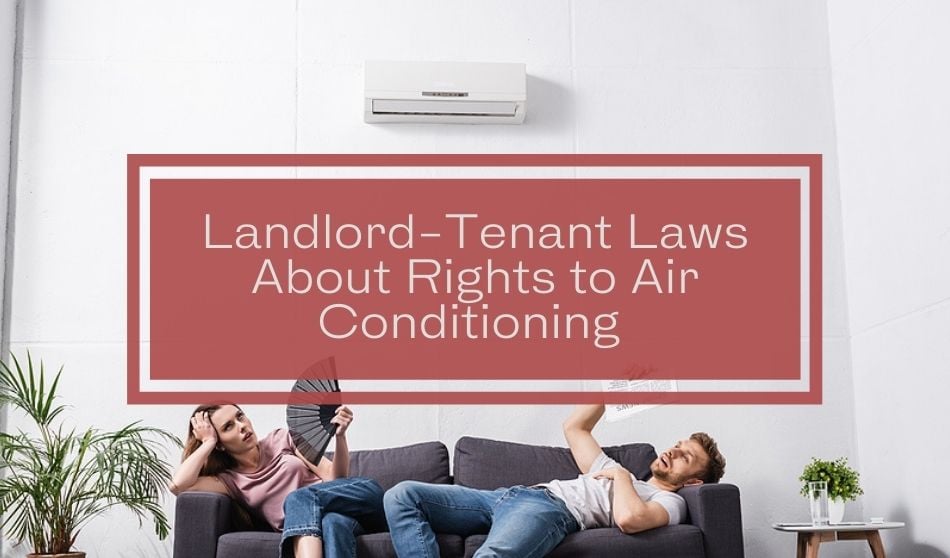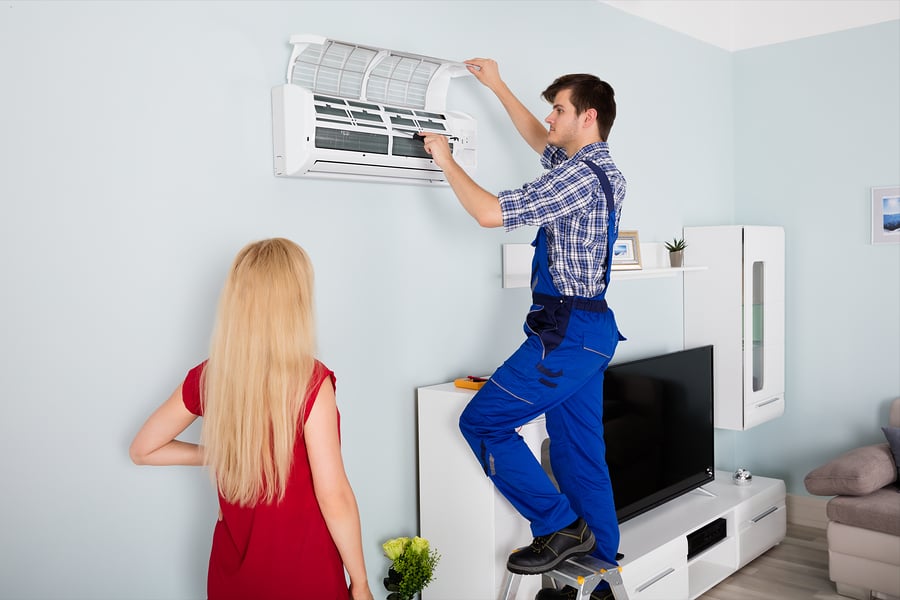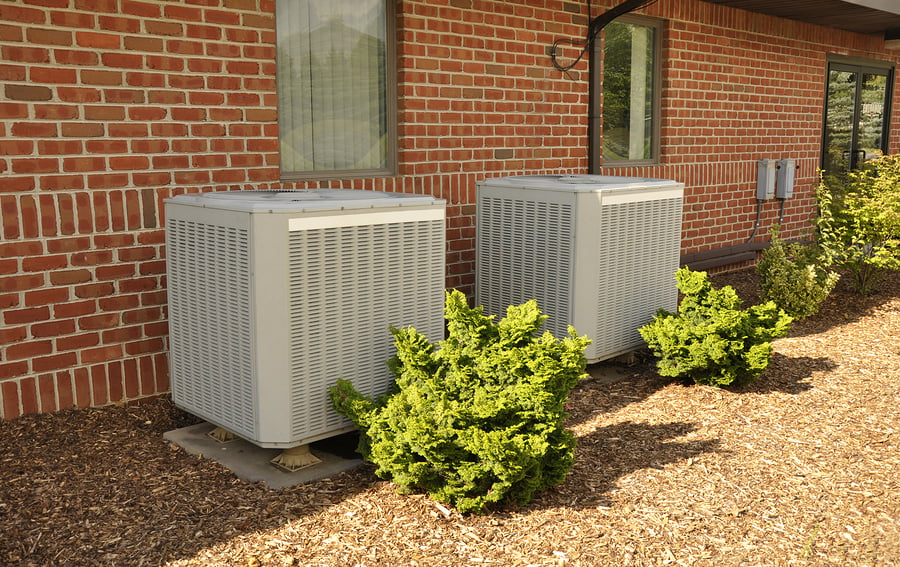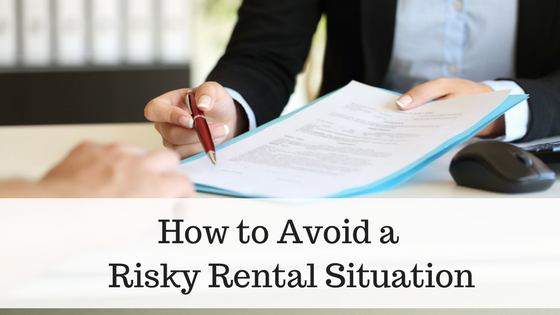
Are landlords required to provide or fix air conditioning? What are tenants rights when an air conditioning unit is not working? Understanding your rights as a tenant and your obligations as a landlord is key. Be sure you understand your Discover your rights and responsibilities when it comes to air conditioning in a rental home in this article by Lisa Oram and originally published by Furnace Compare.
What are a tenant’s rights when the air conditioning breaks?
If the AC in your apartment is on the fritz in the middle of summer, you probably want it fixed yesterday! A few sleepless, sweaty nights will do nothing for your mood when negotiating with the management; however, before you lose your cool completely, be sure to know your rights.
- Is air conditioning an amenity or a necessity?
- Can you fix it yourself and deduct the cost from your rent?
- Who do you call when the landlord just doesn’t respond?
The fact is that landlord-tenant law is complex. To answer any of the questions above, or others that may come up in a particular situation, you must delve into complicated legal territory. (And finding the most accurate and up-to-date information for your area means checking in with an attorney familiar with landlord-tenant law.)
The information that follows gives a basic understanding of what’s at stake and points you in the right direction.
What are your rights when it comes to air conditioning?
Even though heat waves may not make front-page news as dramatically as do earthquakes or hurricanes, extreme heat can be a dangerous killer. According to a report from the Subcommittee on Disaster Reduction, about 175 Americans die from heat-related conditions in a normal year.
In 1995, temperatures in Chicago soared so high that an estimated 700 city residents died during a one-week period in July. More recently, the Earth Policy Institute reports over 52,000 Europeans died in the summer 2003 in “one of the deadliest climate-related disasters in Western history.”
In Houston, where summers are extremely hot and humid, Andy Teas, Vice President of Public Affairs for the Houston Apartment Association, a trade association representing property owners, management companies, developers, and other related professionals in the rental housing industry, says “virtually 100 percent” of apartments come equipped with central air conditioning.
In addition, he says, “Broken air conditioning is the number one maintenance issue we see in summer.”
Teas also notes that changing federal energy guidelines makes air conditioning repair more difficult than it used to be, making it difficult to find the right fit for anyone looking for experienced commercial air conditioning experts without paying an arm and a leg. “You can’t just replace a part or squirt in some Freon,” he says. More often these days, the newer, more efficient parts require changing the compressor or making other major changes to upgrade the entire system.
Teas says that in Texas, a landlord’s responsibility is to “repair or remedy” any condition that “materially affects the physical health and safety of an ordinary tenant.”

“Some judges,” Teas conjectures, “will rule that air conditioning in August definitely affects the health and safety of a resident. Some will say that people have lived without AC for decades, so just deal with it.”
Landlord-Tenant Law
The relationship between a landlord and tenant is governed by the state in which you live. As a result, every state is slightly – or significantly — different. Like with divorce and car accidents, don’t assume what is true in one state holds in another. Get the facts.
The consumer protection departments of many state governments offer some user-friendly information about landlord-tenant law. Searching landlord tenant law on a state government homepage will usually lead to some helpful information.
In addition, searching tenants rights + [the name of a city or state] in a general search engine like Google will also turn up relevant resources.
Finally, the US Department of Housing and Urban Development has an interesting list of resources by state.
In addition to state law, cities can regulate rental practices through municipal ordinance. In the state of Wisconsin, for example, landlord tenant practice is governed by several different administrative statues. Wisconsin as a whole does not have a large renter population, but in the city of Madison, where the majority of residents are renters (US Census, 2000), there is an additional set of codes that make tenants’ rights stronger. In Madison, landlords pay interest on a security deposit; in Oshkosh, any interest earned stays with the landlord.
Despite differences in the details, in most states a landlord’s responsibilities fall under the “warranty of implied habitability.” Habitability generally means “conditions that are fit for living,” but Bill Deegan, Executive Director of The American Tenants Association says, “There is probably no national standard definition of what this means.”
Often a habitable residence is described as one that includes hot water, flushing toilets, non-leaking roofs and walls, heat, doors that lock, and a place to dispose of garbage, among many other things. Habitability is based on safe, sanitary, and secure living conditions; it does not mean perfect or aesthetically pleasing. And, as noted by attorney Kellman above, it does not include air conditioning.
A Word about Leases
A lease is a written document stating the terms of a rental agreement. In some states a written lease is required by law, and in some states it is optional.
Attorney Alberto M. Cardet practices in Miami, Florida where air conditioning is a “big issue.” He says that “landlord- tenant relationships are very casual until something goes wrong. “Then it becomes a he-said-she-said argument.” As a result, Cardet explains, in many places, including Florida, landlord/tenant law “lives and dies on notice issues” meaning when and how did you let the landlord know the A/C was broken and how long did you wait for him to repair? A good lease will spell out the obligations of both the tenant and the landlord in such cases.

Tenants’ organizations or student groups will often have sample leases for review. Knowing in advance what to expect in a lease makes it easier to negotiate.
At the very minimum, make sure the lease has full contact information for the landlord and/or management company. A cell phone number alone is not adequate. Make sure you have a postal address, along with an email address, if possible. Ask if there is an office that answers calls 24 hours a day. Who do you call in the middle of the night?
Cardet recommends two additional things a tenant can do at the beginning of a rental agreement to lessen the chance of a repair problem later.
- First, the tenant can request that all major appliances, including the air conditioning, be inspected by a maintenance professional. That way, both parties will have a common understanding about the condition of the provided appliances. Also, if any operational problem or lack of maintenance is revealed by the inspection, it can be addressed at that time.
- Secondly, Cardet suggests that the tenant can insist on a contract with a maintenance company for repairs. He says that even though a maintenance company may be costlier for the landlord, it is easier and quicker “since there is a 3rd party involved, there is no dispute as to how the air conditioner broke, whether it was landlord failure to maintain or abuse/misuse by the tenant.”
Attorney Kellman says he advises people who are signing a lease to “take a step back” and think about what is most important in a living situation. It’s going to be different for each person, he says. So, if you know you are heat sensitive and will be highly distraught without air conditioning, specify in the lease: “The landlord will maintain the air conditioning in good working order.”
“If a landlord is unwilling to put something in writing that matters to you,” Kellman suggest, “it’s a red flag. A good landlord,” he says, “may be more important than a good property.”
About air conditioning in particular, Kellman says, “If the A/C system was there at the inception of the tenancy, even without a lease, it is included just as if it were a refrigerator or a stove.” A lease, however, could exclude the A/C from maintenance or repairs so it could fail during the tenancy and the landlord may not have to repair it.”
In the Heat of Crisis
So, what’s a tenant to do?
You are definitely not the first person to have landlord troubles, and you are not alone. Most big cities have a tenants’ association, a non-profit organization which provides help to renters. New York City, for example, has at least three: the East Side Tenants Coalition, the West Side Tenants Association, and the citywide Metropolitan Council on Housing.
Tenants groups provide a variety of services including information through publications and programs, helping tenants organize within a building, providing free or low-cost legal counsel, and advocating for tenants rights through a legislative agenda.

Kellman advises strongly that no tenant should take action against a landlord without seeking legal advice first.
There’s big money at stake for the landlord, he cautions, who is running a business. The tenant, who is in “the business of living,” may be inclined to “wing it,” but Kellman says it rarely works out. Common sense or something that worked for a friend or something on the internet may or may not apply in any particular case, and could, in fact, work against the tenant’s best interest.
“The biggest mistake I see,” Kellman says, “is tenants who send mean-spirited, threatening letters to landlords which misinterpret the law and the true legal positions of the parties.” Those letters always end up in court, Kellman says, and make a tenant look unreasonable. Then, when the landlord says nicely how hard he tried to work with the tenant – who was uncooperative and inappropriate – the landlord’s position is more convincing.
As noted above, state and local law will dictate the specific steps a tenant can take in order to pursue a landlord who is not responding to a known problem.
In some states, withholding rent or “fix and deduct” is OK, but only under very specific conditions.
“Withholding rent is always dangerous for the tenant’s case. You have got to make sure you have a strong position,” Kellman explains. “You wouldn’t test a rowboat after you took it out into the middle of the lake, would you? Get advice first.”
Despite the difference between state laws, some practices apply across all tenant/landlord conflicts.
- Consult your lease. Re-read the fine print to clarify what the landlord is responsible for and how you are expected to notify the management of problems.
- Keep a log that documents the history of the problem. After a while, you may not remember which day you called for the first time or whether it was the third or fourth time you left a message.
- Communicate as much as possible in short, polite letters. It is best to send certified letters and keep the receipt of delivery. Keep copies of all letters you send.
- Always consult a lawyer, a housing counselor, or a consumer affairs advocate before acting against your landlord. Even though it may seem logical to withhold rent or do the repair yourself, doing so can inadvertently hurt your case and reduce your rights.
About the Author:
This article was originally published by Furnance Compare and was written by Lisa Oram. This article was originally published in July 2021 and has since been updated.






Great Article: We own a 55 plus adult complex with several units. As it always happens- the AC breaks down during a heat wave on a Friday night without any notice- thats just the nature of the beast. We try to keep the coils clean and we give our tenants new air filters each 90 days at our expense, but when the cool stops- its not always easy to get a technician out to fix the problem immediately , so one backup plan we use is that we keep a extra portable AC unit on hand to put in the rental to help until the unit can be serviced. It shows good faith to our tenants that we care and are responsible. One can purchase a fairly large BTU unit at Costco for about $400.00 .
That’s a great temporary solution to a broken AC unit and awesome advice, thanks Dennis!
I wish my landlord did this. I live in South Florida and it’s the summer time. Second time it has shut off in not even a full month. The A/C guys told the landlord what was wrong, and that she needed to fix it, but she just had them charge it up.
I wish that too. I had the Electric (OUC), do an assessment with found out the AC unit is way too old (2005), and full of mold and they just cleaned it but the temp is still 84 degrees and no word of replacing it even though the asesor stated it needs to be replaced. I have been in this unit for more than 10 years and 7 days of hell. I have a copy of the assessment waiting to take the next step. My lease is up in July and I’m not certain I want to stay. I’m miserable, and feeling sick. The manager questioned the Assessor, saying they are really not experts. What a wench!
What about landlords that won’t turn building a/c on until a certain month it’s 80deg
And you have a heart condition
Good Ideal,
I think that consulting a professional or lawyer is needed too. I think that it is very important to consult or seek advice so that you have a knowledge on how to put action or react. Thanks for sharing these article.
Our AC unit in my single family rental has been broken about a week. We called the landlord company and they sent someone out to look at the unit. He concluded that the compressor was broke and that the system was old and would need to be replaced. He stated someone would be coming out in a week to fix. When no one showed we called the landlord and they said someone would be coming, but not to fix it. They were getting a 2nd opinion to make sure it was broke. I live in Southern California and the temps have been in the mid to high 90’s for a good 3 weeks now. We have 3 kids and dogs and it is stifling in our house. Not sure what to do at this point as buying a small AC unit would be a small band-aid as the house is two stories. I am at my wits end. A friend of ours stated that the landlord should give us a prorated portion of our rent off for the inconvenience. Has anyone heard this before? Our landlord is a company not a person so I am guessing it would be much harder for us to request this.
It is my understanding that in California, a landlord does not need to provide air conditioning to the tenants. And if a unit is broken, it does not make the property uninhabitable (although it will be uncomfortable). So the standard use of repair and deduct would not apply here. You can always ask the landlord if he will discount the rent, but your landlord would do so out of the kindness of his heart not because he is obligated to do so. Here are some answers to a similar question, with references to California state laws. https://www.avvo.com/legal-answers/is-my-landlord-obligated-to-repair-my-a-c-immediat-1257050.html
there are parts of a central AC unit if not fixed the heat will not work such as the indoor Blower motor.
Are you kidding me, today with issue of getting qualified and, either finding HVAC tech that will come out maybe a bit difficult
Sometimes what I did is to engage the repair guy myself as it really takes a long time for my landlord to call their guys down.. But luckily, some of the landlord, including mine are willing to bear the repair cost.
This can work with some landlords to ensure the process is tended to quickly, but it’s always vital to discuss it with your landlord or manager before engaging a repair person. Otherwise, the tenant may be stuck with the bill AND could incur additional costs should the repairman not do a good job and causes additional damage or alters the property without authorization from the owner.
I live in NC. A/C unit went out last night. It’s not cooling. Could be out of free-on. Spoke to property mng. this morning. Landlord never repairs anything. There is extreme mold in the bathrooms and bedroom. The beam to the ceiling came crashing down July 5th. Landlord has yet to repair. If there is alot of mold presence in the home, shouldn’t he fix the A/C? Now there is no ventilation in the home and I am afraid with the mold that I will become very ill.
Hi Lisa, A/C is generally considered an amenity and not a habitability issue, however your extenuating circumstances may qualify. At the very least, the ceiling beam would probably need to be repaired for habitability reasons, and the mold should be addressed. (You can find out more about mold in a rental by going to this article.) I would seek legal advise or consult with a fair housing authority in your area to see what your next steps should be. Best of luck!
Hi. I lived in an apartment and my AC broke one day. I asked for my landlord to fix it, since I know I haven’t done anything wrong with it because I am always working. So, maybe it was broken because of its been years since it was bought. But, my landlord doesn’t want to fix it.
Hi Hannah, I always suggest putting all maintenance requests in writing and keeping a copy. As for a landlord not wanting to repair air conditioning, I would recommend reviewing your lease and check with your local housing authority for information regarding who is responsible for the air conditioning maintenance and repair in your state as it varies across the country.
Great article!
I was looking for the Sub-Zero Refrigerator Repair Chicago At Affordable Prices! I think this blog can help him a lot. Thanks for sharing this informative article.
Keep sharing articles like this.
Will do! Thanks for your kind feedback, Carolyn!
I have an issue with my landlord who is also a large rental property company here in Texas. My air conditioner is an original unit from when the property was built in the 90’s. It’s on death row and the landlord refuses to either repair the leaks or replace the unit insisting that it is my fault. They won’t even acknowledge that they are recharging it, even though I have pictures. I am currently trying to find out what my rights are in this situation, because my landlord does retaliate and becomes progressively abusive when I call out the behavior. As a tenant can I hire an HVAC person to inspect the unit in my apartment and the component outside to get an outside opinion on this? My lease doesn’t expire till January of next year, so I’m stuck. Also, I am also having an issue with my smoke detectors. I have a water leak in one, which causes the other one in my unit to go off. It’s been two months now and the maintenance person in and hooked up one and left the other disconnected. When I inquired about the electrical component I got blasted by him that he fixed it. When in reality he didn’t do a thing. Has anyone else experienced this. Can I bring in an outside contractor to diagnose the issue? Thanks for your feedback.
Hi Christine, Texas does allow for ‘repair and deduct’ for some concerns if you follow the procedures correctly. I would suggest to call your local housing authority and review this website to make sure you understand all the nuances before taking action: Texas Landlord Tenant Law Failure to Repair
Can the apartment complex maintenance consistently add Freon or charge as a fix the keep the ac cool? We’ve had issues to where the ac doesn’t get lower than 74/75 degrees. Especially when it gets around 89 or higher outside it will get up 78 inside even thought it set lower. It will probably get higher if we didn’t have any fans blowing in addition to the ceiling fans. Several maintenance team members say it fine just needs a little charge or we can add some Freon. An outside company did come in said the inside unit needed to be replaced as well as one of the apartment members. Since then we were told its not that old and works as it should. The coolest room is the livingroom. the bedroom farthest is hottest and the coldest with a weak airflow. No one has checked the vents as far as I know. That should be something to check but seems like they don’t want to do that. Granted we are on the top floor with vaulted ceilings but never had issues in the other apartment which half of it was mostly windows facing the west in direct sunlight for most of the day. This one ones gets partial sunlight for a few hours. Can their maintenance manager be a unlicensed, hvac license expired?
By the way I’m in Oklahoma.
First of all this non essential need, cooling or AC is not a equipment under the law in many if not all states in USA. Now, again heating doesn’t fall into the program!
I’m renting an apartment in San Antonio TX and i have been living there for 8 months. I have been robed 3 times, Someone broke into my car 2 times and almost break the front and back door, The stove oven is not working for 2 months and maintenance haven’t show up to fix it, now the A/C stopped working since 1:00 am in the morning. I have called and email the office and they still have me on hold and on the list so I am still waiting for someone to come fix it. I’m working from home and I’m very disappointed and I don’t know what to do anymore
What does it mean if my lease says the tenant is responsible for cooling?
I thought I heard a news story stating ,there were new rules adopted in Portland Ore. re; tenants use of window units during heatwaves….( in places that prohibit them in the lease )… Anyone ???? anyone at all ???
I found this article stating the bill passed the State Senate and heading to the House for a vote (although I’m not sure when): Oregon bill to help renters get air conditioners for extreme heat passes Senate
What about a unit that is to small for a home. Our AC is able to product cold air however “air flow” is extremely low there in order to keep the home cool it runs 24/7. Units normally have a 20-30minute duty cycle then cut off till the temperature gets back up. The property management company doesn’t seem to comprehend that while the home can stay decently cool till we open a door. My electricity cost will be 15-20% higher than the average home.
I’m not sure there are statutes in place that suggest unit size or strength so suggest you check with your local housing authority who can let you know the regulations in your area about air conditioning requirements in rentals.
Very interesting read
continuely having problems with tenants complaining about moisture issues. They have ceiling fans, ac, ac with a dehumidifier, windows that open with safety latch so opening a little or open windows/ with screens and leave door open. The house has impact windows so always telling them it needs air flow. They just won’t use any of the items provided. Instead complain. The ac is under maintenace 2 times a year. Had extensive moisture check under house and said normal. Humidity in normal range. What can be done to get tenants to just use ac, so no damage is done to my house
My A/C has been broken for three days already, according to my landlord it will take approximately 5 more days, I live in Pompano Beach Florida, our temperature is 80 to 85 degrees right now.
I spoke to my landlord and he says “A fan will resolve the problem” it is impossible to sleep like this and he refuses to pay for a hotel room. What is the best way to resolve this problem without incurring into braking the law?
My water cooler is not keeping my rental apartment cool. It’s a mess actually it blows hot air. Reported to management and all I get is the cooler is running at capacity. I even asked, if I purchased a portable air conditioner can the funds be deducted from the rent. Absolutely no kind of solution on helping with keeping my home cool during these sweltering hot days. I wrote a grievance letter to the director of housing hopefully someone will do something about it.
Understanding tenant rights regarding air conditioning is crucial, especially during the sweltering summer months. This comprehensive guide sheds light on the complexities of landlord-tenant laws and offers valuable insights for tenants facing AC issues.
Navigating the nuances of landlord-tenant law can be daunting, but this article provides clarity on key considerations such as whether air conditioning is deemed an amenity or a necessity, and the landlord’s responsibilities in ensuring habitable living conditions.
For tenants in Milwaukee, WI, dealing with AC breakdowns, having a clear understanding of their rights is essential. Partnering with a reputable HVAC service provider like Oasis HVAC ensures timely and professional resolution of AC issues, offering peace of mind to tenants in need of reliable repair services.
By emphasizing the importance of communication, documentation, and seeking legal advice when necessary, this article empowers tenants to advocate for their rights effectively. It serves as a valuable resource for tenants facing AC-related challenges, providing guidance on how to navigate disputes with landlords while protecting their rights.
Excellent piece! Another important aspect to consider in home cooling is maintaining indoor air quality. High humidity levels can make the air feel warmer and impact comfort. Using a dehumidifier can help manage moisture levels, making AC systems more efficient and improving overall air quality. Additionally, ensuring regular maintenance of AC filters can prevent dust and allergens from circulating, benefiting tenants’ health and comfort. Understanding these aspects can greatly enhance the living environment for tenants.
Great post! I really appreciate the valuable insights you shared about HVAC maintenance. It’s amazing how regular upkeep can make such a huge difference in energy efficiency and extend the lifespan of the system. Your tips on cleaning filters and scheduling routine inspections are super helpful, especially for homeowners like me who want to avoid costly repairs down the road. Looking forward to reading more of your expert advice. Keep up the great work!